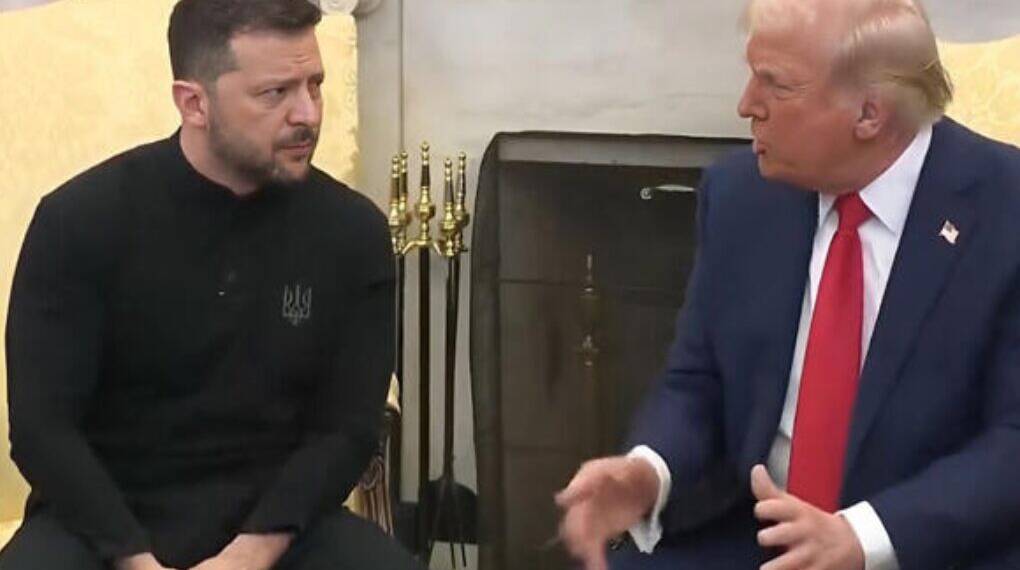In a tense and volatile meeting at the White House on Friday, U.S. President Donald Trump reportedly urged his Ukrainian counterpart, Volodymyr Zelenskyy, to accept Moscow’s terms for ending the war with Russia — a move that stunned diplomats and ignited controversy across Western capitals.
According to the Financial Times, the closed-door talks quickly descended into shouting matches, with Trump “cursing all the time” and berating Zelenskyy for “losing the war.” Sources familiar with the exchange said Trump bluntly told the Ukrainian president, “If [Putin] wants it, he will destroy you. Cut a deal or face destruction.”
The meeting, intended to strengthen U.S.-Ukraine ties and explore pathways to peace, instead revealed deep fissures — not only between Washington and Kyiv but also within the Western alliance over how to end the conflict.
‘Cut a Deal or Face Destruction’
European officials cited by FT said Trump dismissed intelligence briefings and frontline maps presented by the Ukrainian delegation, instead insisting that Kyiv should surrender the entire Donbas region to Russia. His tone, they noted, closely echoed Russian President Vladimir Putin’s rhetoric during a private call the previous day.
Trump’s remarks contradicted his earlier positions, when he claimed he could end the war “through strength” while continuing to arm Ukraine. Instead, the meeting signaled a dramatic policy reversal — one aligning more with appeasement than deterrence.
“He brushed aside every argument Zelenskyy made,” one European diplomat said. “It was as if Trump had internalized Putin’s narrative word for word.”
From ‘Peace Through Strength’ to ‘Freeze the Lines’
The pivot became even more evident when Trump later posted on Truth Social, suggesting that both sides should “stop where they are” and let “history decide” the outcome.
“Enough blood has been shed, with property lines being defined by war and guts,” Trump wrote. “Let both claim victory.”
At a rally in Florida, he further implied that Russia should retain the territories it currently occupies — a stance that effectively recognizes Moscow’s battlefield gains. “We’d much rather have the war be over, to be honest,” Trump said, signaling reluctance to approve Ukraine’s request for long-range Tomahawk missiles.
This represents a sharp departure from Washington’s traditional bipartisan support for Kyiv’s sovereignty and territorial integrity.
Zelenskyy Pushes Back: ‘Ukraine Will Never Bow to Terror’
Returning from Washington empty-handed, President Zelenskyy struck a defiant tone. In a statement on Sunday, he urged allies to stand firm against appeasement, warning that conceding territory to Russia would embolden aggression across Europe.
“Ukraine will never grant terrorists any bounty for their crimes,” Zelenskyy declared. “We count on our partners to uphold this position.”
He called for “decisive steps” from the European-led coalition supporting Ukraine and hinted at organizing a new summit among what he termed the “coalition of the willing” to sustain military and economic backing.
Europe’s Uneasy Reaction and Waning Support
The White House clash comes as Western aid to Ukraine shows signs of fatigue. Data from Germany’s Kiel Institute revealed that foreign military support to Ukraine dropped by 43% in July and August compared to the first half of the year.
Analysts attribute this decline partly to the new NATO-managed Prioritised Ukraine Requirements List (PURL), which channels European contributions toward U.S.-made weapons systems but limits direct American financial involvement.
European leaders fear that Trump’s new stance — which emphasizes “peace at any cost” — could fracture transatlantic unity and leave Ukraine isolated at a critical juncture in the war.
Budapest Summit Looms Large
Adding to the geopolitical tension, Trump confirmed plans to meet Putin “within weeks” in Budapest to discuss the conflict — his first in-person engagement with the Russian leader since returning to the presidency.
The prospect of a Trump–Putin summit has alarmed European officials who worry it could produce a de facto acceptance of Russian territorial gains, reshaping postwar Europe without Ukrainian consent.
For now, Kyiv faces a grim reality: dwindling Western aid, rising battlefield pressure, and a U.S. president seemingly leaning toward Moscow’s terms.
A Turning Point in the War
The fiery Trump–Zelenskyy confrontation may mark a decisive turning point in the Ukraine war. Trump’s insistence on “freezing” battle lines and his warning that “Putin will destroy you” if Kyiv resists represent not only a shift in U.S. foreign policy but also a moral crossroads for the West.
As Zelenskyy rallies allies to resist a new wave of appeasement, one question looms large: will the world stand by Ukraine’s fight for sovereignty, or will Washington’s new pragmatism redraw Europe’s borders once again through the language of force?







